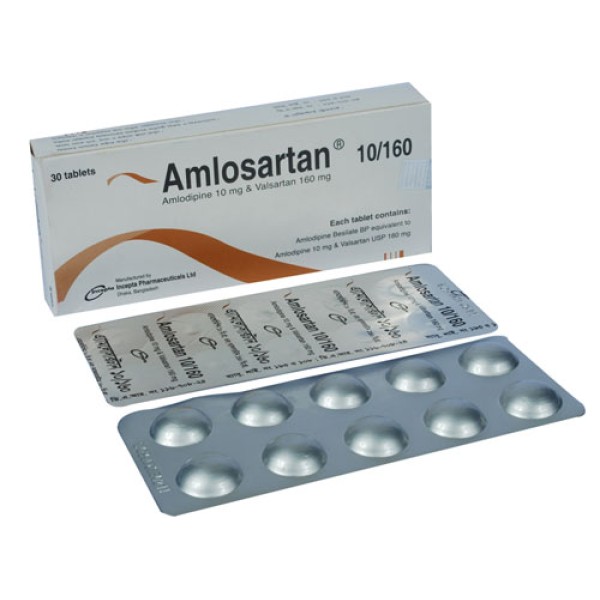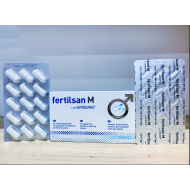
In Stock
Amlosartan 10/160 Tab
Tk9
- Stock: In Stock
- Brand: Incepta Pharmaceuticals
- Product ID: Amlodipine & Valsartan
0 Pcs sold
4836 Interested
This product has a minimum quantity of 10
100% Secure Payment

This Item is for pre order
Estimated Delivery in
Indications
Amlodipine and Valsartan combination is indicated for the treatment of hypertension. This fixed combination drugis not indicated for the initial therapy of hypertension
Therapeutic Class
Combined antihypertensive preparations
Pharmacology
Amlodipine is a dihydropyridine calcium channel blocker that inhibits the transmembrane influx of calcium ions into vascular smooth muscle and cardiac muscle. Valsartan blocks the vasoconstrictor and aldosterone-secreting effects of Angiotensin II by selectively blocking the binding of Angiotensin II to the AT1 receptor in many tissues, such as vascular smooth muscle and the adrenal gland. Its action is therefore independent of the pathways for Angiotensin II synthesis. Amlodipine and Valsartan have been shown to be effective in lowering blood pressure. Both Amlodipine and Valsartan lower blood pressure by reducing peripheral resistance, but calcium influx blockade and reduction of Angiotensin II vasoconstriction are complementary mechanisms.
Dosage & Administration
Amlodipine is an effective treatment of hypertension in once daily doses of 2.5 mg-10 mg while Valsartan is effective in doses of 80 mg-320 mg. In clinical trials with Amlodipine and Valsartan combination using Amlodipine doses of 5 mg-10 mg and Valsartan doses of 160 mg-320 mg, the antihypertensive effects increasedwith increasing doses.
Interaction
No drug interaction studies have been conducted with Amlodipine and Valsartan combination and other drugs, although studies have been conducted with the individual Amlodipine and Valsartan components
Contraindications
Amlodipine and Valsartan combination is contraindicated in patients who are hypersensitive to any compounds of this product.
Side Effects
The most common side effects include peripheral edema, vertigo, nasopharyngitis, upper respiratory tract infection and dizziness.
Pregnancy & Lactation
Pregnancy: Amlodipine and Valsartan combination should not be used in 2nd and 3rd trimester because it can cause fetal death .
Nursing Mothers:It is not known whether Valsartan and Amlodipine are excreted in human milk. Because of the potential for adverse effects on the nursing infant, a decision should be made whether to discontinue nursing or discontinue the drug, taking into account the importance of the drug to the mother.
Nursing Mothers:It is not known whether Valsartan and Amlodipine are excreted in human milk. Because of the potential for adverse effects on the nursing infant, a decision should be made whether to discontinue nursing or discontinue the drug, taking into account the importance of the drug to the mother.
Precautions
Amlosartan should be used with caution because there is a risk for fetal or neonatal morbidity, hypotension, myocardial infarction or increased angina.
Dose should be titrated slowly in patients with impaired hepatic or severely impaired renal function. In general, calcium channel blockers should be used withcaution in patients with heart failure.
Dose should be titrated slowly in patients with impaired hepatic or severely impaired renal function. In general, calcium channel blockers should be used withcaution in patients with heart failure.
Overdose Effects
Limited data of human overdosage have been reported.
Use in Special Population
Pediatric use: The safety and effectiveness has not been established in pediatric patients.
Geriatric use: No differences in overall incidence of adverse events were observed in elderly.
Renal impairment:No initial dosage adjustment is required for patients with mild or moderate renal impairment. Titrate slowly in patients with severe renal impairment.
Hepatic impairment: No initial dosage adjustment is required for patients with mild or moderate liver insufficiency. Titrate slowly in patients with hepatic impairment.
Geriatric use: No differences in overall incidence of adverse events were observed in elderly.
Renal impairment:No initial dosage adjustment is required for patients with mild or moderate renal impairment. Titrate slowly in patients with severe renal impairment.
Hepatic impairment: No initial dosage adjustment is required for patients with mild or moderate liver insufficiency. Titrate slowly in patients with hepatic impairment.
Storage Conditions
Store in a cool dry place protected from light. Keep out of reach of children.



























%20Pvt.%20Ltd./Movicol-Oral-Powder-190x190.jpg)
